人教版 八年级下册Unit 1单词讲解精品名师资料
人教八 下 Unit1 重点词汇讲解

Unit 1 What’s the matter?(重点词汇讲解)词汇一、cut in, cut off ,cut down, cut up辨析比较课文原句:So he used his knife to cut off half his right arm.词汇二、used to, be used to do, get /be used to doing 辨析比较课文原句:As a mountain climber, Aron is used to taking risks.词汇三、trouble/in trouble/get into trouble 辨析比较课文原句:They don't want to get into trouble.语法讲解:表示“烦恼,苦恼,困难,困境,辛劳”等,通常是不可数名词,使用时注意以下句型或结构:词汇四、run out / run out of课文原句:But when his water ran out, he knew that he would have to do something to save his own life.run out和run out of 这两个短语都有“用完”的意思,但用法不同。
1. run out作不及物短语,表示“被用完;被耗尽;(人)把东西用完(或花光)”,其主语通常是时间、金钱、食物等无生命名词。
Red ink ran out. 红墨水用完了。
2. run out of是及物短语,表示主动,主语通常是人。
If we run out of money, we can sell some of the products in Guangzhou.如果我们的钱用完了,可以在广州卖掉一些产品。
(完整)人教版八年级下册Unit1单词讲解.docx
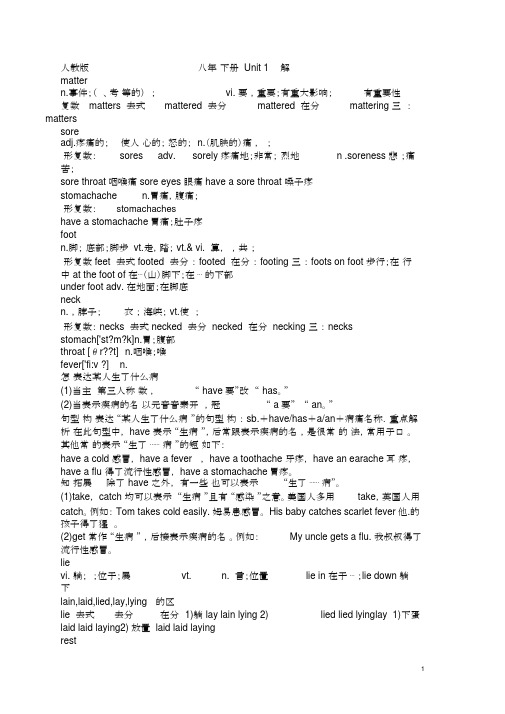
人教版八年下册 Unit 1 解mattern.事件;(、考等的);vi. 要,重要;有重大影响;有重要性复数matters 去式mattered 去分mattered 在分mattering 三:matterssoreadj.疼痛的;使人心的;怒的;n.(肌肤的)痛,;形复数:sores adv.sorely 疼痛地;非常;烈地n .soreness 悲;痛苦;sore throat 咽喉痛 sore eyes 眼痛 have a sore throat 嗓子疼stomachache n.胃痛,腹痛;形复数:stomachacheshave a stomachache胃痛;肚子疼footn.脚;底部;脚步 vt.走,踏; vt.& vi. 算,,共;形复数 feet 去式 footed 去分: footed 在分: footing 三: foots on foot 步行;在行中 at the foot of 在⋯(山)脚下;在⋯的下部under foot adv. 在地面;在脚底neckn.,脖子;衣;海峡;vt.使;形复数: necks 去式 necked 去分 necked 在分 necking 三: necksstomach['st?m?k]n.胃;腹部throat [θr??t] n.咽喉;喉fever['fi:v ?] n.怎表达某人生了什么病(1)当主第三人称数,“ have要”改“ has。
”(2)当表示疾病的名以元音音素开,冠“ a要” “ an。
”句型构表达“某人生了什么病”的句型构: sb.+have/has+a/an+病痛名称.重点解析在此句型中, have 表示“生病”,后常跟表示疾病的名,是很常的法,常用于口。
其他常的表示“生了⋯⋯ 病”的短如下:have a cold 感冒, have a fever , have a toothache 牙疼, have an earache耳疼,have a flu 得了流行性感冒, have a stomachache胃疼。
人教版八下Unit1 SectionA词汇精讲
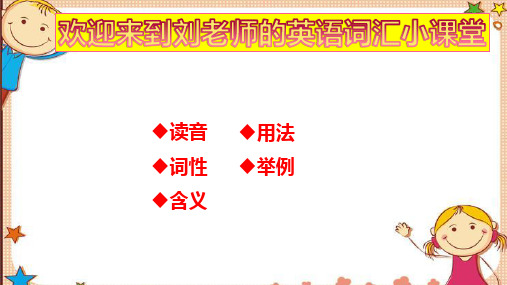
have a cold 表示状态,可与一 段时间连用,不用
于进行时态.
catch/get a cold 表示瞬间动作,不 能与一段时间连
用.
1.你感冒多长时间了?
How long have you ___h_a_d__a__c__o_ld_____?
2.我感冒一个星期了.
I have __h__a_d__a__c_o_l_d____ for one week.
辨析:sore 和ache
sore ache
adj.常放在表示身体部位的名词前,与其构成名词短 语.如:sore throat/sore leg n. 常与表示身体部位的名词合成一个新的名词,表示 “…痛”.如:headache/stomachache/earache
1.我眼睛痛. I have a __s_o_r_e__ eye. 2.她没去上学因为他头痛. She didn’t go to school because she had a __h_e_a_d_a_c_h_e__.
Unit 10 Section A , Section B
Unit 1 What's the matter? 单词表 (P1)
ห้องสมุดไป่ตู้
matter n. 问题;事情
matter /'mætə(r)/ n.问题;事情
我们有重要的问题要讨论.
What's the matter? 怎么了? 出什么事了? We have some __im__p_o_rt_a_n_t _m_a_t_te_r_s__
1.她怎么了?
What's up...?
What's the __m__a_t_te_r__ with her?
人教版(新目标)初中英语八年级下册Unit 1
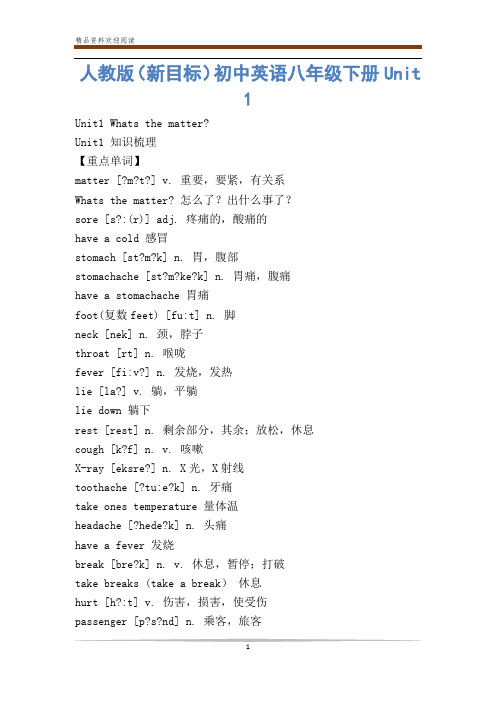
人教版(新目标)初中英语八年级下册Unit1Unit1 Whats the matter?Unit1 知识梳理【重点单词】matter [?m?t?] v. 重要,要紧,有关系Whats the matter? 怎么了?出什么事了?sore [s?:(r)] adj. 疼痛的,酸痛的have a cold 感冒stomach [st?m?k] n. 胃,腹部stomachache [st?m?ke?k] n. 胃痛,腹痛have a stomachache 胃痛foot(复数feet) [fu:t] n. 脚neck [nek] n. 颈,脖子throat [rt] n. 喉咙fever [fi:v?] n. 发烧,发热lie [la?] v. 躺,平躺lie down 躺下rest [rest] n. 剩余部分,其余;放松,休息cough [k?f] n. v. 咳嗽X-ray [eksre?] n. X光,X射线toothache [?tu:e?k] n. 牙痛take ones temperature 量体温headache [?hede?k] n. 头痛have a fever 发烧break [bre?k] n. v. 休息,暂停;打破take breaks (take a break)休息hurt [h?:t] v. 伤害,损害,使受伤passenger [p?s?nd] n. 乘客,旅客off [?f] adv. prep. 离开(某处);从去掉get off 下车to ones surprise 使惊讶,出乎意料onto [nt?] prep. 向,朝trouble [?tr?bl] n. 麻烦,烦扰,问题hit [hit] n. v. 碰撞,打,打击right away 立即,马上get into 陷入,参与herself [h?:?self] pron. 她自己,她本身(she的反身代词)bandage [b?nd?d?] n. v. 绷带;用绷带包扎sick [s?k] adj. 患病的,不适的knee [ni:] n. 膝盖nosebleed [?nzbli:d] n. 鼻出血breathe [bri:e] v. 呼吸sunburned [?s?nb?:nd] adj. 晒伤的ourselves [ɑ:?selvz] pron. 我们自己(we的反身代词)climber [?kla?m?(r)] n. 登山者be used to 习惯于适应于risk [r?sk] n. v. 风险,危险;冒险take risks (take a risk) 冒险accident [ksid?nt] n. 意外事件;事故situation [?sitju?ein] n. 状况,形式,情况kg=kilogram [?k?l?gr?m] n. 公斤,千克rock [r?k] n. 岩石run out (of) 用尽,耗尽knife [naif] n. 刀,餐刀cut off 切除blood [bl?d] n. 血mean [mi:n] v. 意味着,意思是,意欲get out of 离开,从出来importance [?m?p?:tns] n. 重要性decision [d?sn] n. 决心,决定,抉择control [k?ntrl] v. 控制,支配,操纵be in control of 掌管,管理spirit [sp?r?t] n. 勇气,意志death [de] n. 死亡give up 放弃nurse [n?:s] n. 护士【重点短语】1.have a fever 发烧2.have a cough 咳嗽3.have a toothache 牙疼4.talk too much 说得太多5.drink enough water 喝足够的水6.have a cold 受凉;感冒7.have a stomachache 胃疼8.have a sore back 背疼9.have a sore throat 喉咙痛10. take risks 冒险11.hot tea with honey 加蜂蜜的热茶12.see a dentist 看牙医13.get an X-ray 拍X 光片14.take one s temperature 量体温15.put some medicine on sth. 在上面敷药16. give up 放弃17. sound like 听起来像18. all weekend 整个周末19. in the same way 以同样的方式20. go to a doctor 看医生21. go along 沿着走22. on the side of the road 在马路边23. shout for help 大声呼救24. without thinking twice 没有多想25. get off 下车26. have a heart problem 有心脏病27. to one s surprise 另某人惊讶的是28. thanks to 多亏了;由于29. in time 及时30. make a decision 做出决定31. get into trouble 造成麻烦32. right away 立刻;马上33. because of 由于34. get out of 离开;从出来35. keep on doing sth. 继续或坚持做某事36. put a bandage on sth. 用绷带包扎37. fall down 摔倒38. feel sick 感到恶心39. have a nosebleed 流鼻血40. cut his knee 割伤他的膝盖41. put her head back 把她的头向后仰42. have problems breathing 呼吸困难43. mountain climbing 登山运动44. be used to doing sth. 习惯做某事45. run out (of) 用完;用尽46. so that 以便47. so...that... 如此以至于...48. be in control of 掌管;管理49. in a difficult situation 在闲境中【重点句型】1. Whats the matter with you?= Whatthe trouble with you?= Whats wrong with you? 你怎么了?2. What should she do? 她该怎么办呢?3.Should I take my temperature? 我应该量一下体温吗?4.You should lie down and rest. 你应该躺下休息一会儿。
(完整word版)人教版八年级下册Unit1单词讲解

人教版八年级下册Unit 1 单词讲解mattern.事件;(讨论、考虑等的)问题;vi.要紧,重要;有重大影响;有重要性复数matters 过去式mattered 过去分词mattered 现在分词mattering 三单:matters soreadj.疼痛的;使人伤心的;发怒的;n.(肌肤的)痛处,伤处;变形复数:sores adv. sorely 疼痛地;非常;剧烈地n.soreness 悲伤;痛苦;sore throat 咽喉痛sore eyes 眼痛have a sore throat 嗓子疼stomachache n.胃痛,腹痛;变形复数:stomachacheshave a stomachache 胃痛;肚子疼footn脚;底部;脚步vt.走,踏;vt.& vi.结算,总计,共计;变形复数feet 过去式footed 过去分词:footed 现在分词:footing 三单:footson foot步行;在进行中at the foot of在…(山)脚下;在…的下部under foot adv. 在地面;在脚底neckn.颈,脖子;衣领;海峡;vt.使变细;变形复数:necks 过去式necked 过去分词necked 现在分词necking 三单:necks stomach['st?m?k] n.胃;腹部throat [ G??t] n.咽喉;喉咙fever['fi:v ?] n.发烧怎样表达某人生了什么病(1)当主语为第三人称单数时,“ have S改为“ ha。
(2)当表示疾病的名词以元音音素开头时,冠词“a S变为“an”句型结构表达某人生了什么病”的句型结构为:sb.+ have/has+ a/an+病痛名称. 重点解析在此句型中,have 表示“生病”,后常跟表示疾病的名词,是很常见的说法,常用于口语。
其他常见的表示“生了……病”的短语如下:have a cold 感冒,have a fever发烧,have a toothache牙疼,have an earache耳朵疼, have a flu得了流行性感冒,have a stomachaches疼。
人教版英语八年级下册Unit1 知识点精讲
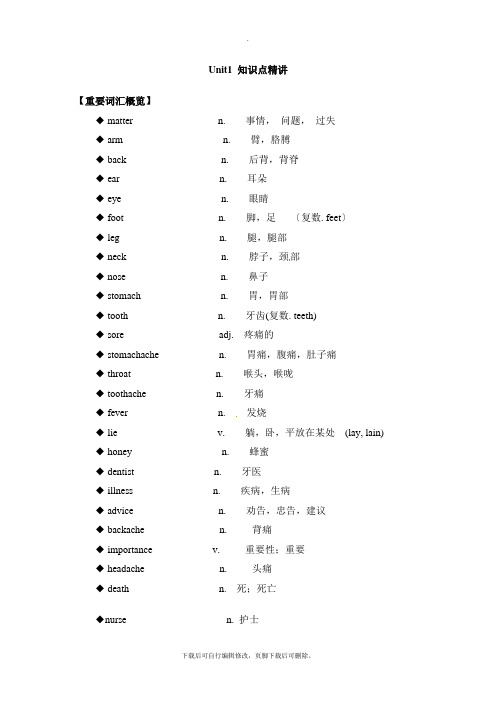
Unit1 知识点精讲【重要词汇概览】◆ matter n.事情,问题,过失◆ arm n.臂,胳膊◆ back n.后背,背脊◆ ear n.耳朵◆ eye n.眼睛◆ foot n.脚,足〔复数. feet〕◆ leg n.腿,腿部◆ neck n.脖子,颈部◆ nose n.鼻子◆ stomach n.胃,胃部◆ tooth n.牙齿(复数. teeth)◆ sore adj.疼痛的◆ stomachache n.胃痛,腹痛,肚子痛◆ throat n.喉头,喉咙◆ toothache n.牙痛◆ fever n.发烧◆ lie v.躺,卧,平放在某处(lay, lain)◆ honey n.蜂蜜◆ dentist n.牙医◆ illness n.疾病,生病◆ advice n.劝告,忠告,建议◆ backache n.背痛◆ importance v. 重要性;重要◆ headache n. 头痛◆ death n. 死;死亡◆nurse n. 护士◆ knife n. (复数.knives)刀【重要词组概览】◆ have a cold患感冒◆ take breaks(take a break) 休息◆ lie down 躺下◆ get off 下车◆ be used to 习惯于...;适应于...◆ on the other hand另一方面◆ get a cold患感冒◆ see a dentist看牙医◆take one’s temperature 量体温◆ make sb sick使某人不舒服(患锁病)◆ have a sore throat嗓子痛◆ have a fever发烧,发热◆ have a toothache牙痛◆ have a backache背痛◆ have a headache头痛◆give up 放弃◆cut off 切除◆get out 〔of〕用尽;耗尽◆take risks〔take a risk〕冒险◆get into 陷入;参与◆right away 立即;马上◆to one’s s urprise 使...惊讶的;出乎...意料【语法知识聚焦】看病需要和医生交流,这是英语口语中必不可少的内容。
人教版八年级英语下册 Unit1 知识点讲解
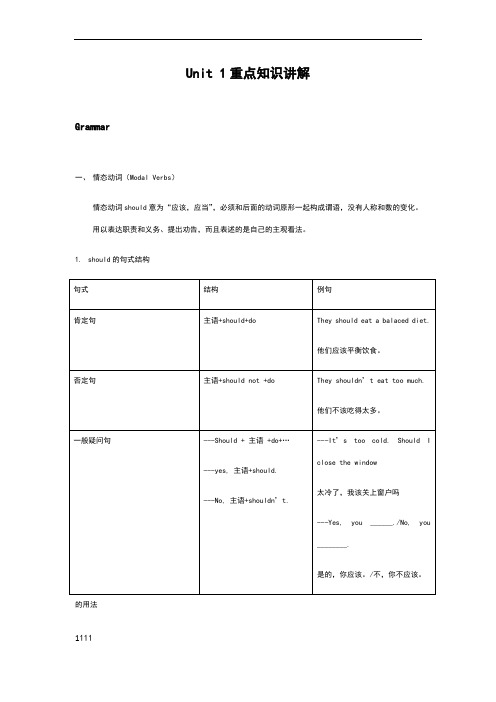
Unit 1重点知识讲解Grammar一、情态动词(Modal Verbs)情态动词should意为“应该,应当”,必须和后面的动词原形一起构成谓语,没有人称和数的变化。
用以表达职责和义务、提出劝告,而且表述的是自己的主观看法。
1.should的句式结构的用法注意:should在以why,who,how等疑问词开头的问句中,意为“竟然,居然,怎么会”,表示意外、惊喜或在说话人看来是不可思议的。
二、其他表示建议的句型三、反身代词表示反射或强调的代词叫做反身代词。
反身代词是由第一人称、第二人称形容词性物主代词或第三人称代词的宾格形式,词尾加self或selves组成。
反身代词可译“本人”、“本身”,为加强语气,也常翻译为“亲自”、“自己”。
不定人称代词one-----oneself.1、反身代词的分类2、反身代词的用法单词的用法Section A1.What’s the matter怎么了该句常用询问某人患了何种疾病或遇到了什么麻烦,其后用with引出对象。
1). What’s the matter with sb.=what’s wrong with sb.=what’s the trouble/problem with sb.=what’s one’s trouble/problem. What’s the matter with Tom=what’s _________ with Tom=What’s the _________ with Tom=What’s Tom’s _________2). matter, 名词,“问题,事情”. We have important _________(matter) to discuss.我们有些重要的问题要讨论。
3). 动词,“要紧,关系重大”. It dosen’t _________ that you came late.2.I have a cold.我感冒了。
(完整版)人教版八年级英语下册Unit1知识点讲解(可编辑修改word版)

Unit 1 重点知识讲解Grammar一、情态动词(Modal Verbs)情态动词should 意为“应该,应当”,必须和后面的动词原形一起构成谓语,没有人称和数的变化。
用以表达职责和义务、提出劝告,而且表述的是自己的主观看法。
1.should 的句式结构2.s hould 的用法喜或在说话人看来是不可思议的。
二、其他表示建议的句型表示反射或强调的代词叫做反身代词。
反身代词是由第一人称、第二人称形容词性物主代词或第三人称代词的宾格形式,词尾加self 或selves 组成。
反身代词可译“本人”、“本身”,为加强语气,也常翻译为“亲自”、“自己”。
不定人称代词one ---- oneself.1、反身代词的分类2、反身代词的用法单词的用法Section A1.What’s the matter?怎么了?该句常用询问某人患了何种疾病或遇到了什么麻烦,其后用with 引出对象。
1). What’s the matter with sb.?=what’s wrong with sb.?=what’s the trouble/problem with sb.?=what’s one’s trouble/problem?e.g. What’s the matter with Tom?=what’s with Tom?=What’s the with Tom?=What’s Tom’s?2). matter, 名词,“问题,事情”e.g. We have important (matter) to discuss.我们有些重要的问题要讨论。
3). 动词,“要紧,关系重大”e.g. It dosen’t that you came late.2.I have a cold.我感冒了。
1).have/get/catch a cold “感冒,着凉”The old man a cold yesterday.那位老人昨天感冒了。
人教八年级英语下册Unit1重点单词讲解(19PPT)

拓展
get into trouble
陷入麻烦
Eg: Don’t trouble trouble until the
get out of trouble 解决麻烦
trobuebinletrotruobluebles yo处u于. 麻烦中
make trouble
不制造要麻自烦 寻烦恼
2. lie n.& v.
重要 用法
冒着生命危险去做 某事
be in the risk of … 冒着…的危险
5. mean v.&n. 意思是,打算,意欲
派生词:meaning n.含义 meaningful 有意义的
meaningless毫无意义的
短语 mean to do sth 打算做某事 mean doing sth 意味着做某事
9. death n. 死亡,死
He couldn’t help crying when he heard about his wife’s death. 同根词: die (v.死—短暂性动词) dead (adj.死的) The little rabbit died on a cold morning. I found a dead rabbit under the tree.
We must control ourselves and keep happy.
短语 be in control of
烟台中考: Learn to be
in
___c_o__n_t_r_ool f
you
own
life
instead
of
_c_o__m__p_a__ri_n_g__with others all the time.
(完整版)人教版八年级英语下册Unit1知识点讲解.doc
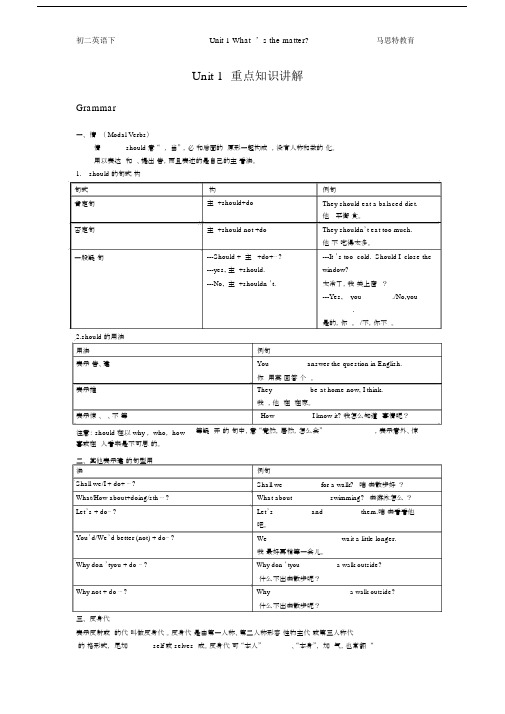
初二英语下Unit 1 What ’s the matter?马思特教育Unit 1 重点知识讲解Grammar一、情( Modal Verbs)情should 意“ ,当” ,必和后面的原形一起构成,没有人称和数的化。
用以表达和、提出告,而且表述的是自己的主看法。
1.should 的句式构句式构例句肯定句主 +should+do They should eat a balaced diet.他平衡食。
否定句主 +should not +do They shouldn’t eat too much.他不吃得太多。
一般疑句---Should + 主 +do+⋯ ? ---It ’s too cold. Should I close the---yes, 主 +should. window?---No, 主 +shouldn ’t. 太冷了,我关上窗?---Yes, you ______./No,you________.是的,你。
/不,你不。
2.should 的用法用法例句表示告、建You _________ answer the question in English.你用英回答个。
表示推表示惊、、不等注意: should 在以 why , who, how 喜或在人看来是不可思的。
二、其他表示建的句型用法Shall we/I + do+ ⋯ ?What/How about+doing/sth ⋯ ? Let’s + do⋯ ?You’d/We’d better (not) + do⋯ ?They _________ be at home now, I think.我,他在在家。
How _________ I know it? 我怎么知道事情呢?等疑开的句中,意“竟然,居然,怎么会”,表示意外、惊例句Shall we _________ for a walk?咱去散步好?What about _________ swimming?去游泳怎么?Let’s _________ and _________ them.咱去看看他吧。
人教版英语八年级下册第1单元重点知识汇总
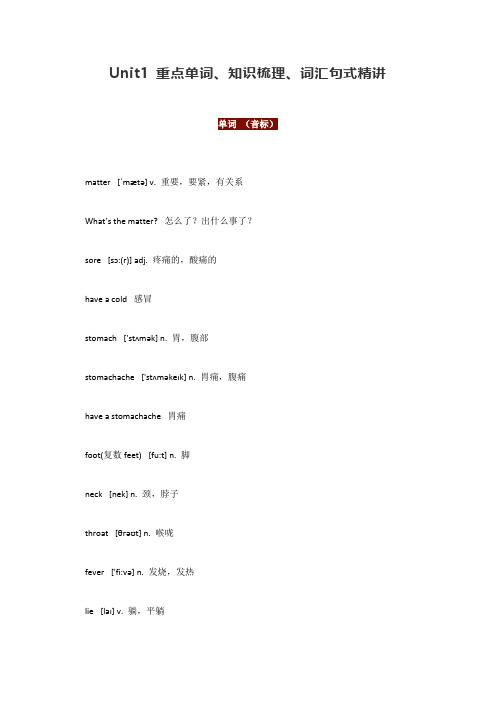
Unit1 重点单词、知识梳理、词汇句式精讲matter [ˈmætə] v. 重要,要紧,有关系What’s the matter? 怎么了?出什么事了?sore [sɔ:(r)] adj. 疼痛的,酸痛的have a cold 感冒stomach ['stʌmək] n. 胃,腹部stomachache ['stʌməkeɪk] n. 胃痛,腹痛have a stomachache 胃痛foot(复数feet) [fu:t] n. 脚neck [nek] n. 颈,脖子throat [θrəʊt] n. 喉咙fever ['fi:və] n. 发烧,发热lie [laɪ] v. 躺,平躺lie down 躺下rest [rest] n. 剩余部分,其余;放松,休息cough [kɒf] n. & v. 咳嗽X-ray ['eksreɪ] n. X光,X射线toothache [ˈtu:θeɪk] n. 牙痛take one's temperature 量体温headache [ˈhedeɪk] n. 头痛have a fever 发烧break [breɪk] n. & v. 休息,暂停;打破take breaks (take a break)休息hurt [hə:t] v. 伤害,损害,使受伤,疼passenger ['pæsɪndʒə] n. 乘客,旅客off [ɒf] adv. prep. 离开(某处);从…去掉get off 下车to one's surprise 使…惊讶,出乎…意料onto [ˈɒntə] prep. 向,朝trouble [ˈtrʌbl] n. 麻烦,烦扰,问题hit [hit] n. & v. 碰撞,打,打击right away 立即,马上get into 陷入,参与herself [hə:ˈself]她自己,她本身(she的反身代词)bandage ['bændɪdʒ] n. & v. 绷带;用绷带包扎sick [sɪk] adj. 患病的,不适的knee [ni:] n. 膝盖nosebleed [ˈnəʊzbli:d] n. 鼻出血breathe [bri:ð] v. 呼吸sunburned [ˈsʌnbɜ:nd] adj. 晒伤的ourselves [ɑ:ˈselvz]我们自己(we的反身代词)climber [ˈklaɪmə(r)] n. 登山者be used to 习惯于… 适应于…risk [rɪsk] n. & v. 风险,危险;冒险take risks (take a risk) 冒险accident [ˈæksidənt] n. 意外事件;事故situation [ˌsitjuˈeiʃən] n. 状况,形式,情况kg=kilogram [ˈkɪləgræm] n. 公斤,千克rock [rɔk] n. 岩石run out (of) 用尽,耗尽knife [naif] n. 刀,餐刀cut off 切除blood [blʌd] n. 血mean [mi:n] v. 意味着,意思是,意欲get out of 离开,从… 出来importance [ɪmˈpɔ:tns] n. 重要性decision [dɪ'sɪʒn] n. 决心,决定,抉择control [kən'trəʊl] v. 控制,支配,操纵be in control of 掌管,管理spirit ['spɪrɪt] n. 勇气,意志death [deθ] n. 死亡give up 放弃nurse [nə:s] n. 护士Judy 朱迪(女名)Nancy 南希(女名)Mandy 曼迪(女名)Aron Ralston 阿伦·罗尔斯顿Utah 尤他州(美国)Unit1 知识梳理【重点单词】matter [ˈmætə] v. 重要,要紧,有关系What’s the matter? 怎么了?出什么事了?sore [sɔ:(r)] adj. 疼痛的,酸痛的have a cold 感冒stomach ['stʌmək] n. 胃,腹部stomachache ['stʌməkeɪk] n. 胃痛,腹痛have a stomachache 胃痛foot(复数feet) [fu:t] n. 脚neck [nek] n. 颈,脖子throat [θrəʊt] n. 喉咙fever ['fi:və] n. 发烧,发热lie [laɪ] v. 躺,平躺lie down 躺下rest [rest] n. 剩余部分,其余;放松,休息cough [kɒf] n. & v. 咳嗽X-ray ['eksreɪ] n. X光,X射线toothache [ˈtu:θeɪk] n. 牙痛take one's temperature 量体温headache [ˈhedeɪk] n. 头痛have a fever 发烧break [breɪk] n. & v. 休息,暂停;打破take breaks (take a break)休息hurt [hə:t] v. 伤害,损害,使受伤passenger ['pæsɪndʒə] n. 乘客,旅客off [ɒf] adv. prep. 离开(某处);从…去掉get off 下车to one's surprise 使…惊讶,出乎…意料onto [ˈɒntə] prep. 向,朝trouble [ˈtrʌbl] n. 麻烦,烦扰,问题hit [hit] n. & v. 碰撞,打,打击right away 立即,马上get into 陷入,参与herself [hə:ˈself] pron. 她自己,她本身(she的反身代词)bandage ['bændɪdʒ] n. & v. 绷带;用绷带包扎sick [sɪk] adj. 患病的,不适的knee [ni:] n. 膝盖nosebleed [ˈnəʊzbli:d] n. 鼻出血breathe [bri:ð] v. 呼吸sunburned [ˈsʌnbɜ:nd] adj. 晒伤的ourselves [ɑ:ˈselvz] pron. 我们自己(we的反身代词)climber [ˈklaɪmə(r)] n. 登山者be used to 习惯于… 适应于…risk [rɪsk] n. & v. 风险,危险;冒险take risks (take a risk) 冒险accident [ˈæksidənt] n. 意外事件;事故situation [ˌsitjuˈeiʃən] n. 状况,形式,情况kg=kilogram [ˈkɪləgræm] n. 公斤,千克rock [rɔk] n. 岩石run out (of) 用尽,耗尽knife [naif] n. 刀,餐刀cut off 切除blood [blʌd] n. 血mean [mi:n] v. 意味着,意思是,意欲get out of 离开,从… 出来importance [ɪmˈpɔ:tns] n. 重要性decision [dɪ'sɪʒn] n. 决心,决定,抉择control [kən'trəʊl] v. 控制,支配,操纵be in control of 掌管,管理spirit ['spɪrɪt] n. 勇气,意志death [deθ] n. 死亡give up 放弃nurse [nə:s] n. 护士【重点短语】1.have a fever 发烧2.have a cough 咳嗽3.have a toothache 牙疼4.talk too much 说得太多5.drink enough water 喝足够的水6.have a cold 受凉;感冒7.have a stomachache 胃疼8.have a sore back 背疼9.have a sore throat 喉咙痛10. take risks 冒险11.hot tea with honey 加蜂蜜的热茶12.see a dentist 看牙医13.get an X-ray 拍X 光片14.take one’ s temperature 量体温15.put some medicine on sth. 在……上面敷药16. give up 放弃17. sound like 听起来像18. all weekend 整个周末19. in the same way 以同样的方式20. go to a doctor 看医生21. go along 沿着……走22. on the side of the road 在马路边23. shout for help 大声呼救24. without thinking twice 没有多想25. get off 下车26. have a heart problem 有心脏病27. to one’ s surprise 另某人惊讶的是28. thanks to 多亏了;由于29. in time 及时30. make a decision 做出决定31. get into trouble 造成麻烦32. right away 立刻;马上33. because of 由于34. get out of 离开;从……出来35. keep on doing sth. 继续或坚持做某事36. put a bandage on sth. 用绷带包扎37. fall down 摔倒38. feel sick 感到恶心39. have a nosebleed 流鼻血40. cut his knee 割伤他的膝盖41. put her head back 把她的头向后仰42. have problems breathing 呼吸困难43. mountain climbing 登山运动44. be used to doing sth. 习惯做某事45. run out (of) 用完;用尽46. so that 以便47. so...that... 如此……以至于...…48. be in control of 掌管;管理49. in a difficult situation 在闲境中【重点句型】1. What's the matter with you?= What'the trouble with you?= What's wrong with you? 你怎么了?2. What should she do? 她该怎么办呢?3.Should I take my temperature? 我应该量一下体温吗?4.You should lie down and rest. 你应该躺下休息一会儿。
人教版八年级英语下册unit1知识点归纳整理+新人教版,grammar-focusogkk精品

新人教版八年级英语下册unit1知识点归纳整理+新人教版,grammar-focusogkk精品新人教版八年级英语下册,unit1知识点一、基本知识点1. What’s the matter (with you)? 怎么了?出什么事了?What’s the trouble/ the problem / wrong with sb./ sth.?2. I had a cold.我感冒了。
have a cold=catch a cold=have the flu have a fever have a cough咳嗽have a stomachache胃疼,肚子疼have a toothache牙疼have a headache头疼3. 身体部位+ache(疼痛)构成新的复合词stomach+ache=stomachache head+ache=headache tooth+ache=toothache back+ache=backache后背痛4. much too+ 词,意为,too much+ 词,意为。
5. enough【形容、副词】足够的/地,enough放在名前后,形副后。
good enough足够好,enough money=money money6. lie down躺下,lie 躺,躺着,过去式lay;lie说谎,过去式lied7. maybe “或许”,常用于句首,表示可能性,后加句子。
Maybe you are right.may be,是情态动词+be的结构,意为“可能,也许”,后加名词、代词或形容词。
He may be angry.8. sound like+名词代词和从句:It sounds like you don’t know the truth. It sounds like a good idea.sound+形容词,“听起来,好像”,The music sounds nice.9. need 需要,实义动词need+名词,需要某物;need to do sth.需要做某事,主语通常是人,表示人主动的动作:You need to listen carefully during class.need doing sth.主语通常是物,表示被动的动作:Your dirty clothes need washing.10. get off (the bus) 下(公交车)get on 上车11. agree 同意,赞同;同意做某事,同意某人的看法、观点。
(完整版)人教版八年级英语下册Unit1知识点讲解

Unit 1重点知识讲解Grammar一、情态动词(Modal Verbs)情态动词should意为“应该,应当”,必须和后面的动词原形一起构成谓语,没有人称和数的变化。
用以表达职责和义务、提出劝告,而且表述的是自己的主观看法。
喜或在说话人看来是不可思议的。
表示反射或强调的代词叫做反身代词。
反身代词是由第一人称、第二人称形容词性物主代词或第三人称代词的宾格形式,词尾加self或selves组成。
反身代词可译“本人”、“本身”,为加强语气,也常翻译为“亲自”、“自己”。
不定人称代词one-----oneself.单词的用法Section A1.What’s the matter?怎么了?该句常用询问某人患了何种疾病或遇到了什么麻烦,其后用with引出对象。
1). What’s the matter with sb.?=what’s wrong with sb.?=what’s the trouble/problem with sb.?=what’s one’s trouble/problem?e.g. What’s the matter with Tom?=what’s _________ with Tom?=What’s the _________ with Tom?=What’s Tom’s _________?2). matter, 名词,“问题,事情”e.g. We have important _________(matter) to discuss.我们有些重要的问题要讨论。
3). 动词,“要紧,关系重大”e.g. It dosen’t _________ that you came late.2.I have a cold.我感冒了。
1).have/get/catch a cold “感冒,着凉”The old man _________ a cold yesterday.那位老人昨天感冒了。
人教版英语八年级下册Unit1知识点知识讲解
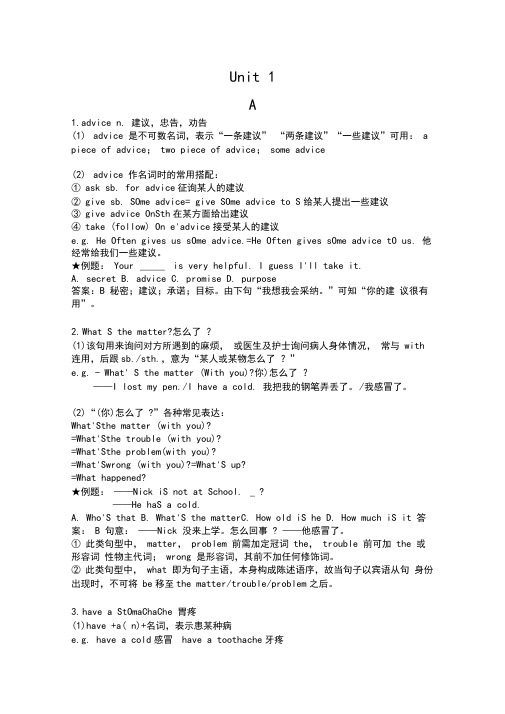
Unit 1A1.advice n. 建议,忠告,劝告(1)advice 是不可数名词,表示“一条建议” “两条建议”“一些建议”可用:a piece of advice;two piece of advice;some advice(2)advice 作名词时的常用搭配:①ask sb. for advice征询某人的建议②give sb. SOme advice= give SOme advice to S给某人提出一些建议③give advice OnSth在某方面给出建议④take (follow) On e'advice接受某人的建议e.g. He Often gives us sOme advice.=He Often gives sOme advice tO us. 他经常给我们一些建议。
★例题:Your _____ is very helpful. I guess I'll take it.A. secretB. adviceC. promiseD. purpose答案:B 秘密;建议;承诺;目标。
由下句“我想我会采纳。
”可知“你的建议很有用”。
2.What S the matter?怎么了?(1)该句用来询问对方所遇到的麻烦,或医生及护士询问病人身体情况,常与with 连用,后跟sb./sth.,意为“某人或某物怎么了?”e.g. - What' S the matter (With you)?你)怎么了?——I lost my pen./I have a cold. 我把我的钢笔弄丢了。
/我感冒了。
(2)“(你)怎么了?”各种常见表达:What'Sthe matter (with you)?=What'Sthe trouble (with you)?=What'Sthe problem(with you)?=What'Swrong (with you)?=What'S up?=What happened?★例题:——Nick iS not at School. _ ?——He haS a cold.A. Who'S thatB. What'S the matterC. How old iS heD. How much iS it 答案:B 句意:——Nick 没来上学。
人教版初二(下)英语第1讲:unit 1 词汇篇(教师版)

人教版初二(下)英语第1讲:unit 1 词汇篇(教师版)Unit 1 词汇篇____________________________________________ __________________________________________________________________________________ ______________________________________学生通过本讲学习,能够掌握本单元的重点词汇句型,并在综合能力上有一定的拓展。
1.matter的用法(1)名词:事情,问题What’s the matter? =what’s wrong (with you)? =what’s the trouble怎么啦?出什么事啦?(2)动词:有重大影响,有重要性如:What does it matter?2.疾病的表达法have a cold/a fever/ a toothache/ a stomachache 3.take 的固定搭配take one’s temperature/ take breaks/ take risks/take some medicine/take off/ take care of/take away4.surprise的用法1.做名词:to one’s surprise 使。
惊讶的,出乎。
意料A. hasB. haveC. hadD. having 解析:1. 本题题意要表达是“我认为它没有关系”故选A2. 此题考的是固定搭配的辨析。
Take out 为拿出,take away 为拿走,take off 为出发,脱下,故选C。
3. 根据题意为“我想让我妈妈大吃一惊”故选A。
4. 依据题意为“他一下车就意识到他的钱包落到车上了”get on 上车,get off 下车,get to 到达,get in 进入,故选B5. 本题题意为“她妈妈习惯于午餐后休息一会”故选D。
- 1、下载文档前请自行甄别文档内容的完整性,平台不提供额外的编辑、内容补充、找答案等附加服务。
- 2、"仅部分预览"的文档,不可在线预览部分如存在完整性等问题,可反馈申请退款(可完整预览的文档不适用该条件!)。
- 3、如文档侵犯您的权益,请联系客服反馈,我们会尽快为您处理(人工客服工作时间:9:00-18:30)。
人教版八年级下册Unit 1单词讲解
matter
n.事件;(讨论、考虑等的)问题;vi.要紧,重要;有重大影响;有重要性
复数matters 过去式mattered 过去分词mattered 现在分词mattering 三单:matters
sore
adj.疼痛的;使人伤心的;发怒的;n.(肌肤的)痛处,伤处;
变形复数:sores adv. sorely 疼痛地;非常;剧烈地n.soreness 悲伤;痛苦;
sore throat 咽喉痛sore eyes 眼痛have a sore throat 嗓子疼
stomachache n.胃痛,腹痛;
变形复数:stomachaches
have a stomachache 胃痛;肚子疼
foot
n.脚;底部;脚步vt.走,踏;vt.& vi.结算,总计,共计;变形复数feet 过去式footed 过去分词:footed 现在分词:footing 三单:foots
on foot 步行;在进行中at the foot of 在…(山)脚下;在…的下部
under foot adv. 在地面;在脚底
neck
n.颈,脖子;衣领;海峡;vt.使变细;
变形复数:necks 过去式necked 过去分词necked 现在分词necking 三单:necks
stomach['stʌmək]n.胃;腹部
throat[θrəʊt] n.咽喉;喉咙
fever['fi:və] n.发烧
怎样表达某人生了什么病
(1)当主语为第三人称单数时,“have”要改为“has”。
(2)当表示疾病的名词以元音音素开头时,冠词“a”要变为“an”。
句型结构表达“某人生了什么病”的句型结构为:sb.+have/has+a/an+病痛名称.
重点解析在此句型中,have表示“生病”,后常跟表示疾病的名词,是很常见的说法,常用于口语。
其他常见的表示“生了……病”的短语如下:
have a cold感冒,have a fever发烧,have a toothache 牙疼,have an earache耳朵疼,have a flu得了流行性感冒,have a stomachache胃疼。
知识拓展除了have之外,还有一些词也可以表示“生了……病”。
(1)take,catch均可以表示“生病”且有“感染”之意。
美国人多用take,英国人用catch。
例如:Tom takes cold easily.汤姆易患感冒。
His baby catches scarlet fever.他的孩子得了猩红热。
(2)get常作“生病”讲,后接表示疾病的名词。
例如:My uncle gets a flu.我叔叔得了流行性感冒。
lie
vi. 躺;说谎;位于;展现vt. 谎骗n. 谎言;位置lie in 在于…;lie down 躺下
lain,laid,lied,lay,lying的区别
lie 过去式过去分词现在分词1)躺lay lain lying 2)说谎lied lied lyinglay 1)下蛋laid laid laying2)放置laid laid laying
rest
n.休息;宁静,安宁vt.& vi.(使)休息;(使)倚靠[支撑];vi.休息;静止;停止;
变形复数:rests 过去式:rested 过去分词rested 现在分词resting 三单:rests
the rest of 其余的;剩下的have a rest 休息一会儿a good rest 好好休息
rest time 休息时间;静止时间rest room 休息室;(公共建筑物内的)厕所
cough
n. 咳嗽,咳嗽声;咳嗽病vt. 咳出vi. 咳嗽
cough up 咳出;勉强说出;have a cough (患)咳嗽
X-ray[ˈeks reɪn.X射线;X光
toothache['tu:θeɪk] n.牙痛
take one's temperature 量体温
headache['hedeɪk] n.头痛
have a fever发烧
break vt.(使)破;vi.(嗓音)突变;突破;n.破裂;
中间休息;间断;
变形过去式:broke 过去分词:broken 现在分词:breaking 第三人称单数:breaks
take breaks (take a break) 休息break out v. 爆发;突发break away 脱离;放弃;逃跑
break away from vt. 放弃;脱离……break up with与…断绝关系break the law 违法
give me a break 让我休息一下break up 打碎,结束;解散;break down 分解;发生
hurt
vt.损害;使受伤;vi.疼痛;感到疼痛;n.伤害;痛苦;adj.受伤的;痛苦的;
变形复数:hurts 过去式:hurt 过去分词:hurt 现在分词:hurting 三单:hurts
get hurt 受伤feel hurt 感到不快hurt badly严重受伤passenger['pæsɪndʒə] n.乘客;旅客
off [ɒf] adv.&prep.离开(某处);不工作;从……去掉
get off下车go off 离开;right off 立刻;马上from off 从…离开
to one' s surprise 使……惊讶的;出乎……意料
onto ['ɒntʊ] prep.向;朝
trouble['trʌbl] n.问题;苦恼
in trouble 在监禁中;处于不幸中;处困难中have trouble v. 在...有困难
make trouble 捣乱;制造麻烦have trouble with v. 与...有
纠纷;有...的病痛
out of trouble 摆脱麻烦;脱离了困境stomach trouble 胃病make trouble for 给……带来麻烦
知识讲解problem trouble matter disease
problem n.难题,问题;Do you know how to deal with this problem?你知道怎样处理这个问题吗?trouble 麻烦事;烦恼Tell me about your trouble.把你的烦恼讲给我听听。
matter 事情,问题We have more important matter to be considered.我们还有重要的事待考虑。
disease 疾病。
trouble不可数,matter ,problem 可数disease复数:diseases
hit
vt.& vi.打打击;碰撞;击(球);n.打,打击;碰撞;(演出等)成功;批评,
变形复数:hits 过去式:hit 过去分词:hit 现在分词:hitting 第三人称单数:hits
right away 立即;马上。
